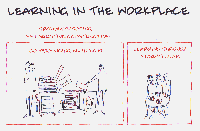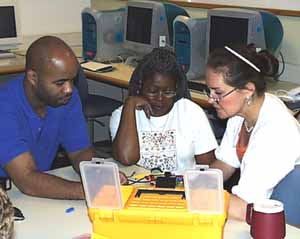| LIFE IS AN EXPLORATION (AND FUN)
SCIENCE IS AN EXPLORATION (AND FUN)
EDUCATION SHOULD BE ...
AN EXPLORATION, AND FUN
Among the great ironies of our culture is that science, a fundamentally open-ended and exploratory activity, is frequently taught so much as a body of "facts" that many students become estranged from science, and most are deprived of an opportunity to have experiences which strengthen and reinforce their own inclination to experiment, question, and explore ... both the world outside and themselves. Materials presented here are aimed at finding ways to make science education, and education in general, more exploratory, and more fun.
|
|
I believe
that education must be conceived as a continuing reconstruction
of experience, that the process and the goal of education are
the same thing.
I believe that education, therefore, is a process of living
and not a preparation for future living.
-- John Dewey, My
Pedagogic Creed
The teacher is not only a communicator but a model. To communicate
knowledge and to provide a model of competence, the teacher
must be free to teach and learn
-- Jerome
Bruner, The Process of Education
|
|
K-12
Resources and Discussions
- Hands-on Activities for Teaching Biology
to High School or Middle School Students - Ingrid Waldron, a member
of the Biology Department at the University of Pennsylvania, in collaboration
with both colleagues at Penn and K-12 teachers, developed a set of hands-on
biology activities which include topics such as "Studying Our Senses"
with jelly beans, "Dragon Genetics," and "Moldy Jell-O."
- Off the Shelf Chemistry - Bob Farber,
a chemistry teacher at Central High School in Philadelphia, PA, developed
a set of 18 chemistry activities for high school students, using consumer
products for experiments and not requiring a lab and specialized equipment.
- Serendip hosts Workshops for High
School Teachers, ranging from one day to two week hands-on seminars
on teaching with technology, teaching science across the curriculum,
and bridging the two culture gap.
- Serendip's Togo
Connection - Susan White, Associate Professor and Chair of the Chemistry
Department at Bryn Mawr College, worked with the Peace Corps in the
West African nation of Togo from 1978 to 1981, teaching physical sciences
in public high schools. During subsequent visits, she has talked with
teachers, school administrators, and government officials about how
Americans and Togolese might work together to enhance educational opportunities
internationally. Materials presented here (see directory)
are aimed at developing ways to bring American and Togolese educators
and students closer together.
- Mind and Body: René
Descartes to William James - Robert H. Wozniak, Professor of Psychology
at Bryn Mawr College, developed this web exhibit, modified from the
Catalogue Accompanying an Exhibition of Books from the Collections of
the National Library of Medicine, 1992. Also available in Spanish.
- A Hands-On
Interactive Approach to HTML - Creating web pages is easy to begin
learning, and to go on learning, in a hands-on, exploratory, interactive
way, emblematic of the web itself and the kinds of new directions it
makes available for education.
- Many interactive
exhibits on Serendip are in the Playground section, including Prisoners'
Dilemma, Sierpinski's
Triangle, and Simple
Networks, Simple Rules. Time
to Think is a research lab experiment which uses Serendip to measure
simple reaction times, as well as reaction times in a number of increasingly
complex "thinking" tasks. Explore, learn and enjoy.
- Brain Matters, A question
and answer forum for K-12 students
Pedagogical
Discussions
We
think we
learn from teachers, and we sometimes do. But the teachers are not
always to be found in school, or in great laboratories. Sometimes
what we learn depends on our own powers of insight. Moreover, our
teachers may be hidden, even the greatest teacher.
-- Loren Eiseley,
"The Hidden Teacher" in The Star Thrower
A manual? Give me a break! Let me get in there and muck around and
try various things and see what happens.
-- John Seely Brown, "Learning,
Working, and Playing in the Digital Age"
|
- Empowering Learners: Theory and Practice of Extra-Classroom Teaching, a handbook
from Alice Lesnick and her students with issues such as partnering with classroom teachers, how to give effective praise to students, and how to facilitatate discussion about intense topics. - 2005
- Education and Technology: Serendip's
Experiences 1994-2004, an exhibit exploring how we use the web,
synthesized by Paul Grobstein and Jody Cohen - 2004
- Writing Descartes: I Am,
and I Can Think, Therefore ... , an essay by Paul Grobstein and
an ongoing experiment in story sharing and story evolution among many
colleagues: "The bottom line of the "less wrong" idea
is not only that a given story is not "right" but further
that it is significant only insofar as it becomes a part of an expanding
network of story sharings and alterations, from which all involved get
things of value to themselves and for which all involved share responsibility.
We are attempting here to both model and illustrate this process, in
relation to a set of ideas for which the process is itself an expression."
- 2004
- Science In Society in the 21st
Century: Interdisciplinarity and Beyond, a talk by Paul Grobstein
at Juniata College - 2004
- Emergent Pedagogy: Learning
to Enjoy the Uncontrollable and Make it Productive, a working draft
of an article which the authors have submitted for publication, by Doug
Blank, Kim Cassidy, Anne Dalke and Paul Grobstein - 2004
- Teaching With/On the Web,
outline for a talk summarizing emerging pedagogy on the web over 10
years - 2004
- Education as Applied Neurobiology:
Students and Teachers As Story Tellers/Listeners/Exchangers, notes
for a talk on Changing Pedagogies in Math and Science Education - 2004
- Graduate Idea Forum 2003-04:
Explorations of Teaching: What, Why, How and Who, an ongoing discussion
with faculty and graduate students, includes bibliography and reading
materials
- Story-Telling in (At Least)
Three Dimensions: An Exploration of Teaching Reading, Writing, and Beyond,
a working draft of an article by Anne Dalke and Paul Grobstein - 2003
- Culture as Disability,
a previously published essay by Ray McDermott and Herve Varenne in a
new web version with an online forum.
- Science Education: What's it all about? -
essays by faculty and students involved in science education, reflecting
on what goes right and what doesn't.
- The Scientist/Teacher: A Call to Arms
- "The time is ripe for renewed expressions of commitment to the
scientist/teacher ideal. The myth of a conflict between teaching and
research needs to be destroyed, and for this we need to make renewed
efforts to establish our own careers as viable counterexamples."
- Science and Non-Science:
Bridging the Two Culture Gap - a discussion with precollege teachers,
using C.P. Snow's 1959 essay as a starting point for conversation about
how sciences and mathematics are currently handled in the curriculum,
and how one might imagine improving it. From the Diversity
and Discovery Institute, 2000.
- Introductory Science: Experiments in Bridging
Cultures - notes for a talk discussing experiments in teaching over
the last decade, with online examples - 2002.
 |
Learning,
Working, and Playing in the Digital Age - annotated transcript
of a talk by John Seely Brown: "My interest here today is
in looking at the notions of learning, working and playing in
the digital age and how today's kids—growing
up digital—might actually be quite different from what
we might first think. But, more particularly, how by stepping
back and looking at the forces and trends underlying the digital
world, we may have a chance to create a new kind of learning matrix,
one that I will call a learning ecology," 1999. |
|
- Serendip Credo on Education and Technology,
from the Inquiry,
Interaction, and Technology program: "Above all, do no harm
-- remember that what is even more important than teaching what to think
is teaching how to think, how to make better and better sense of the
world....", 2000.
- Gathering Web Evidence To Think About Education:
every educational issue is both a mirror of and a key influence on aspects
of society and culture,and thoughts about such issues are the essential
grist for always possible improvements in education; a study by Felicia
Lew, 1998.
- Education and Technology - resources,
thoughts, forum for thinking about the relation between the two, 1997.
- Additional Resources
Brain
and Education
College
Faculty Resources and Discussions
- Serendip is the web host for the Center
for Science in Society at Bryn Mawr College, which sponsors programs
and discussions involving scientists and non-scientists as well
as academics and non-academics, which are essential to continuing explorations
of
the natural world and humanity's place in it,
the nature of education,
the generation, synthesis, and evaluation of information,
technology and its potentials,
the relationships among forms of creativity and understanding.
- Faculty art exhibits
are on permanent display on Serendip.
- Structures of Support:
Women Negotiating the Corporate Academy, a faculty workshop - 2004
- Mind and Body: René
Descartes to William James - Robert H. Wozniak, Professor of Psychology
at Bryn Mawr College, developed this web exhibit, modified from the
Catalogue Accompanying an Exhibition of Books from the Collections of
the National Library of Medicine, 1992. Also available in Spanish.
- Exploring
All Paths: Collaborative Products and Process, 2000 - notes for
a talk by Liz McCormack (Physics), Paul Grobstein (Biology) and Sasha
Schwartz (student of Physics) on quantum mechanics, web-based learning,
and collaboration, with an interactive exhibit in Richard Feynman's
world.
- Many interactive
exhibits on Serendip are in the Playground section, including Prisoners'
Dilemma, Time to Think, and the Game of Life. Explore, learn and enjoy.
Undergraduate
Course Web Sites
- Serendip hosts Bryn Mawr and Haverford College undergraduate courses
which experiment with pedagogy, are primarily discussion-oriented, have
strong, interdisciplinary focus, and utilize web resources. Many include
"web
papers" that students research and submit for discussion and
evaluation, as well as resource links and materials selected by professors.
Some examples of courses are Introductory Biology, Neurobiology and
Behavior and The Nature of Inquiry: Story Telling and Retelling in the
Sciences and Humanities.
- Materials and resources from short seminars
at Bryn Mawr College include topics of wellness and of women's health.
Links
to Web Resources by Topic
|

